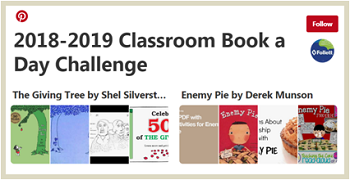

BLOGS > MAY 2, 2019
BY NICOLE STROUP

As an educational coordinator, I often come across educators who are stuck in a rut. They feel their students are not mastering the standards that they so painstakingly taught them, and wonder why students can do it with support, but struggle to put it together independently on a cold read or summative assessment.
When I hear educators bring up these concerns and frustrations, my first response to them is to try a think-aloud. Many of us have heard the phrase, and some of us have tried it but feel uncomfortable. To me this is the number one strategy that actually has the carryover from instruction to application and independence. So, what is a “think aloud” and how do students use it?
A “think aloud” is a metacognitive strategy where the teacher models their thinking out loud to the class. What is encouraging about this strategy is it can be done through any instruction and content. It is not isolated to just reading. So, how do I actually implement this in my classroom?
I like to use a strategy that Kristina Smekens from Smekens Education illustrates. There are multiple voices going through our heads daily. Each student has a reading voice, thinking voice and distracting voice. A reading voice is where you are reading the text and taking in what the text says. A thinking voice is the voice you hear when you are applying different strategies like asking questions, making connections, making predictions and analytically thinking through the text. Daydreams are a distracting voice that get us off topic and are not important to the story or strategies being used. Sounds interesting right? I’m sure you are using your thinking voice right now!
How to get started: A great introductory mini lesson would be to share with students these three voices that readers use and model for them reading the text, thinking about the text and being distracted with outside thoughts. You may want to start with a wordless picture book. Read the pictures, explaining you are using a reading voice, then seamlessly insert a thought about what is happening, what you are wondering, or any predictions you are making and explain how that is a thinking voice. Then, insert something completely off topic and crazy like, “Last night my brother was eating cookies.”
Students will quickly pick up on how absurd a distracting voice is and be able to identify what voice they are using when they read. What is awesome about this strategy is it doesn’t take away from your instruction or take up more time in your day. You’re simply using best practice quickly and explicitly to model for students the strategies you’re teaching and want them to master throughout a text.
These three voices will help get you comfortable with your own thinking and modeling it for students. It won’t be long that students pick up the idea of the three voices and start using them on their own. Make time throughout the day to have them tell you what voices they are using and have them complement each other’s thinking throughout the text. For more information about using the three voices, check out Kristina’s website here.
Give it a try and see how your world will change once students start internalizing their own voice and applying the strategies you are modeling.

NICOLE STROUP
Regional Office of Education, Lake County IL
With over 10 years of experience in education, Nicole Stroup has been instrumental in supporting staff development, leading teachers, and developing curriculum for districts throughout Lake County. She has rich experience as both an instructional coach and ELA Content Facilitator. She has enhanced the professional learning experience of teachers throughout our area and brings both enthusiasm and a passion for instructional coaching and literacy to her new role. With a Master’s Degree in both Reading Instruction and Educational Leadership, she is committed to serving Lake County schools and districts as a support for English Language Arts curriculum, school improvement, and professional development. Nicole’s broad experience includes teaching at the elementary level as well as supporting school library media staff on library improvements. She emphasizes flexible learning environments, passion for content, and a desire to support the professional learning needs of Lake County educators. Nicole resides in Volo, IL with her husband and young daughter. In her leisure, Nicole enjoys golfing and supports her local girl’s gymnastics team as a coach.

Read all #classroombookaday articles on Follett Community written by our contributing classroom teachers.
Watch #classroombookaday webinars presented by our contributing classroom teachers as well as Jillian Heise, founder of #classroombookaday.

Follow Follett Learning's #classroombookaday Pinterest board for great resources on the titles featured.

Shop the #classroombookaday book list on Follett Titlewave®.
An Author Interview with Drew Daywalt
June 27, 2025
Drew Daywalt, award-winning author of the best-selling The Day the Crayons Quit series, is about to release his second middle grade book with illustrator Mike Lowery, No Sam! and the Meow of Deception. The title continues the hilarious adventures of Sam...
Read more
An Author Interview with Adam Wallenta and Makana Wallenta
June 27, 2025
Get ready to rock the galaxy with the first volume of Punk Taco – a wildly imaginative, music-fueled sci-fi adventure from father-son duo Adam and Makana Wallenta. Created when Makana was just five years old, this award-winning graphic novel now debuts...
Read more
An Author Interview with Lisa Manuzak Wiley
June 27, 2025
A bewitching new graphic novel series is arriving this fall!Author-illustrator Lisa Manuzak Wiley, who grew up in Hawaii, blends cozy fantasy, sisterhood, and tropical charm in a heartfelt homage to her roots: The Witches of Pepperwood Bay Vol. 1. Lisa...
Read more
What We're Reading – Books to Add to Your TBR List
June 4, 2025
As a Follett Content Outside Sales Consultant, I’m not only an avid reader, but also a passionate book reviewer! I’ve curated my top 10 book picks that are perfect for adding to your To Be Read (TBR) list. These titles...
Read more
Author Joseph Koszary on the Changes Made to the International Baccalaureate Extended Essay
May 22, 2025
As someone who’s served as an extended essay coordinator, examiner, and supervisor, I’ve grown deeply familiar with the previous incarnation of the extended essay (EE). Like many of you, years of accumulated experience have made supporting students through the process...
Read more
Celebrate Literacy All Year Long: Host an Online Book eFair!
May 12, 2025
Reading and literacy are essential parts of our lives, and there are numerous events throughout the year dedicated to celebrating and promoting these important skills. Hosting a Follett Book eFair is a fantastic way to engage your school community, share the...
Read more